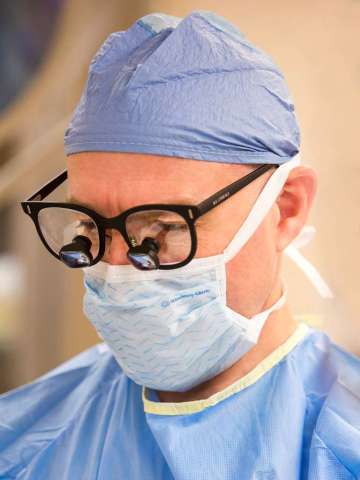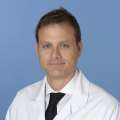Testicular Cancer
Our testicular health and cancer experts offer patients research-based treatments and innovative surgical procedures found only at major cancer centers like UCLA Health.

Why choose UCLA Health for testicular cancer treatments?
UCLA Health's Testicular Cancer Program in the Department of Urology is part of the Institute of Urologic Oncology and the UCLA Health Jonsson Comprehensive Cancer Center (JCCC).
Our deep experience, testicular cancer specialists, and multi-disciplinary team provide comprehensive and personalized care with rapid access to all clinical services. We take care of the physical, mental, and emotional needs of our patients with testicular cancer.
Our testicular cancer specialists offer:
Access to innovative research: As an academic medical center, we offer eligible patients early access to clinical research studies for promising testicular cancer treatments and surgical techniques.
Convenience: UCLA Health is proud to offer expedited, high-quality care for men with testicular cancer.
Expert, patient-centered care: UCLA Health consistently ranks among the top eight urology programs in the country. Our team draws on decades of experience to create a tailored care plan that fits your needs.
Advanced surgeries: Our surgeons are highly experienced in sophisticated procedures such as robot-assisted lymph node surgeries and small-incision orchiectomies (testicle removal).
Our services
UCLA Health's Testicular Cancer Program offers comprehensive services, including:
Diagnosis
The first sign of testicular cancer is usually a lump in a testicle. If you find a mass, your doctor may order one or more of the following tests:
Ultrasound: To look for a tumor in the testicle, your doctor may recommend this imaging exam. Ultrasound uses sound waves to produce detailed pictures of the body. It's usually the first test a doctor uses to detect testicular cancer.
Blood panel: Your doctor takes a sample of your blood and sends it to a lab. The lab checks for increased tumor marker levels, indicating the presence of certain proteins that could signal testicular cancer.
Imaging tests: These tests determine if the cancer has spread or if treatment is working. They may include a CT scan, MRI, or positron emission tomography (PET) scan.
Cancer support
We understand the challenges that come with a testicular cancer diagnosis and treatment. That's why UCLA Health offers supportive care at the Simms Mann- UCLA Center for Integrative Oncology. The center provides numerous resources to guide you and your loved ones through your cancer journey. You'll find stress management workshops, mind-body healing seminars, counseling and more.
Types of testicular cancer we treat
Most testicular cancers start in the germ cells, which make sperm. That's why they are called germ cell tumors (GCT). Two main types of GCTs are:
- Seminoma: This is the most common type of GCT.
- Non-seminoma germ cell tumor (NSGCT): This type occurs as one or more of four main subtypes that may appear alone or in combination and can spread to the lymph nodes or other area of the body:
- Choriocarcinoma
- Embryonal carcinoma
- Teratoma
- Yolk sac carcinoma
Other very rare testicular cancers called stromal tumors begin in the tissues (stroma) that produce hormones. Stromal tumors are rare in adults but account for about one-fifth of testicular cancers in children. Stromal tumors are usually benign and treated surgically. They rarely spread.
Testicular cancer treatments we offer
Testicular cancer is usually curable, even in advanced stages. Care is based on many years of strong evidence on what works best, including surgery, chemotherapy, and occasionally radiation.
Nonsurgical testicular cancer treatment
Your doctor might recommend a nonsurgical treatment before or after surgery. We offer:
Chemotherapy: This treatment uses systemic (body-wide) cancer-killing medications that destroy cancerous cells and shrink tumors.
Radiation therapy: An outpatient treatment, radiation uses targeted rays of energy to shrink tumors and kill cancerous cells in the scrotum. Doctors may use radiation to treat seminoma tumors after surgery or to target microscopic cells located in the lymph nodes.
Testicular cancer surgery
Surgery is usually the preferred treatment for testicular cancer. You may need one or both procedures:
Orchiectomy: During this procedure, surgeons remove a cancerous tumor through an incision in the groin. They remove only the affected testicle and leave the normal testicle in place. Surgeons can insert a silicone testicle prosthesis to make the testicles symmetrical and restore a more natural appearance after an orchiectomy. A man with one testicle has normal libido and erections and continues to produce sperm.
Retroperitoneal lymph node dissection: Doctors use this procedure to remove lymph nodes from the back of the abdomen. If testicular cancer spreads, it almost always spreads to these lymph nodes. Surgeons may use a traditional, open approach (midline incision) or robot-assisted laparoscopy (minimally invasive surgery) to perform this complex procedure.
Testicular Cancer Videos & Patient Stories
Meet our team
Our expert testicular cancer specialists are centralized in one location, working together as a team to deliver sophisticated treatments for testicular cancer. With unparalleled expertise, we provide you with personalized, world-class care.
Contact us
Call 310-794-7700 to request an appointment with a testicular cancer specialist at UCLA Health.
Find your care
We deliver compassionate care and effective treatments for testicular cancer. To learn more, call UCLA Urology at 310-794-7700.





